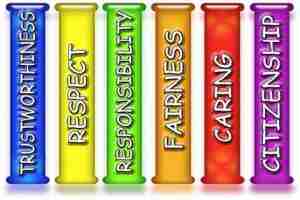Values Matter
- Divya Hari Rao
Editorial Team
We live in a world that is connected by technology but broken into fragments by social evils. As the world continues to evolve, more problems arise, adding to the already existing problems, constantly challenging human lives. In this kind of world, it becomes a challenge for a parent or a teacher or a peer to lead every child towards the right path. Albert Einstein, one of the greatest scientists of the 20th century, once said, ŌĆ£Try not to become a man of success, but rather try to become a man of valueŌĆØ. These valuable words stress on the fact that a person with values will be respected more than a successful person. Hence, values are extremely important in todayŌĆÖs mechanised world.
Value education in School
A childŌĆÖs environment plays an important role in moulding the childŌĆÖs character and behavior. A child spends most of his/her childhood in schools, which then becomes the centre for imparting values. Though children are taught values at home, such values tend to be more inclined towards religious and cultural aspects. While in schools, there is a more secular approach in teaching values to children. In such an environment, children tend to easily accept cultural and religious differences and also learn to be more tolerant. Along with this, the child is exposed to various social situations that are no faced by students at home.

Importance of value education
Our Indian education system focusses more towards enabling students to work in various institutions. Hence, the major subjects like Mathematics, Science, Social Science and the languages are taken more seriously. There are exam patterns that grade these subjects which decide the varied the interests of the children that help them to choose a career option.
So, the question may arise as to why value education needs to be taken seriously, when the ŌĆśsubjectŌĆÖ is not of much ŌĆśvalueŌĆÖ in the educational records. Values are something that cannot be classified as a separate category of learning with its own system of ranking. Values cannot be marked. Values need to be integrated into everyday life of a child and the lessons learnt from the values remain throughout with them. There are certain qualities that shape the social behavior of the child through value education. They are:
-
It helps children in developing communication skills and also helps in articulating their ideas distinctly.
-
It empowers children to take up responsibility to bring in a change for the better.
-
It allows children to understand themselves and develop a sense of self and concern towards other.
-
It also encourages children to reflect on everyday life.
-
It enhances the social, economic and moral well-being of a child shaping him/her to be a responsible citizen.
Teaching value education in the digital age
In todayŌĆÖs world, digital medium has proven to be an effective form of learning. Now that e-boards have entered the classrooms, it is time to integrate knowledge with values. With several stories, videos and images available online, it is easier to download sources and show it to children on the digital boards. Such sources present social situations explaining the relevance of concepts, which tends to have greater impact on children than the textbooks for value education. Since, todayŌĆÖs children are born into the digital world, it is easy for them to adapt to such kind. Also, the visual images and videos make learning more interactive and fun. Such learning enhances the memory of the students as they are able to retain certain things, as it would be helpful for their future. Thus, values are an important for every individual and it needs to be learnt and instilled into oneŌĆÖs own life, in order to co-exist in a society.




 +91 8041202438
+91 8041202438




